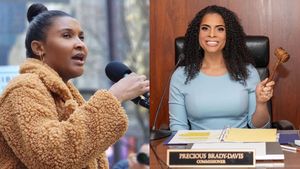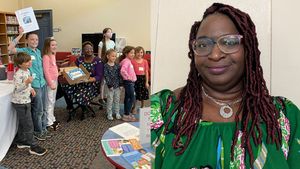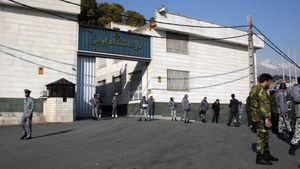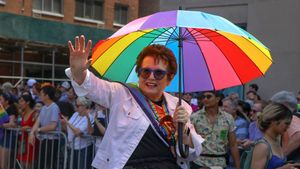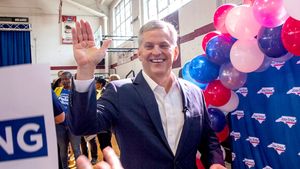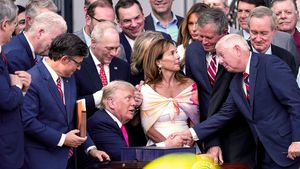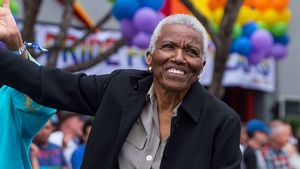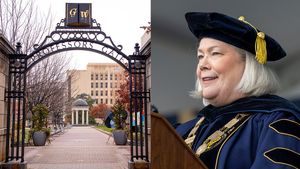From Left: Jeremy Pope, Nathan Lee Graham, Michael Longoria, Nancy Ticotin, Frenchie Davis
In 1973, the Upstairs Lounge, a popular, albeit hush-hush refuge for queer people in New Orleans, was burned to the ground. Patrons were still inside the bar during the blaze and many lost their lives. The tragedy was underreported, but it was the worst hate crime of its kind until last year's massacre at Orlando's Pulse nightclub.
Related | OUT100: The Survivors and Heroes Of Pulse
In 2017, writer and composer Max Vernon (along with director Scott Ebersold) has resurrected some of those souls and their stories with The View Upstairs, a vibrant Off-Broadway musical that's been packing seats and will continue its run at New York's Lynn Redgrave Theater through May 21. Telling the story of Wes (Jeremy Pope), a black, gay, modern-day entrepreneur who's magically transported back in time to meet the Upstairs regulars, the rousing musical has been filling seats thanks to the talent and topicality on display. RuPaul has avidly endorsed it; bigwigs like Michael Kors have sat in the audience. On April 26, the show was nominated for the Off-Broadway Alliance Award for Best New Musical.

Jeremy Pope
The View Upstairs is a hot ticket because it's funny, touching, musically remarkable and revelatory about a forgotten piece of history, as well as our current times. But it's revolutionary because of just how daringly diverse it is. Pope performs eight nights a week as a black, gay lead character (who, furthermore, sparks up an interracial romance with a white bar patron played by Taylor Frey). The show-stopping Nathan Lee Graham plays Willie, an Upstairs regular and flamboyant queen of a certain age who represents a generation of similar black gay men. Songstress Frenchie Davis is Henri, the black lesbian who runs the bar and serves as mother hen to a clientele in desperate need of one. Gay Latino actor Michael Longoria plays Freddie, a drag queen who overcomes shame to achieve self-actualization. And Nancy Ticotin, a veteran Latina actress, is Freddie's mom, Inez, who stands as a model for what blind maternal love should ideally look like.
Related | Gallery: The View Upstairs
This is not your average stage production; and this is not your average cast. In an intimate and candid roundtable discussion, Pope, Graham, Davis, Longoria and Ticotin (all of them queer save the latter) sat down to discuss why this work is important for them, for their viewers and for the world at large.
OUT: The View Upstairs is about a real place and an actual tragedy from our history. What did each of you know about the story and this bar before getting involved with the project?
Jeremy Pope: I knew nothing about it. When I was reading the script I was unsure if it was fiction or nonfiction. But after reading it and hearing about how it actually happened, and how people didn't know about it, I felt like it was so important to tell the story right now. I'm from Orlando [where the Pulse shooting occurred], so there were so many parallels. I felt like I, Jeremy Pope, needed to tell this story.
Nancy Ticotin: I didn't know anything about it and I came to the show at the last minute. Somebody else was in my part, and she had to leave to go to a different job. I read it late at night and it just touched me. I think I knew it was a true story but I hadn't heard about the actual story until the script came my way.
Michael Longoria: I had been out of the theater game for a while, and doing a lot of concert work, and this is one of the first auditions my new manager brought to me. He told me what it was about, so before I read the script I went online and watched some videos, including an amazing documentary some guy made on his own, taking a trip to New Orleans to find more out about the people who were there and the history. That made me excited. I'm a gay person and I'd never played a gay part. I'm also a Mexican American, and I'd never played any Latino part. I've always been cast as an Italian. Or straight. The last production I did was Jersey Boys where I played Frankie Vallie. Then all of a sudden there's the part of gay Puerto Rican drag queen--that's so close to who I am as a real person. I'd also happened to just get a concert gig in New Orleans, and that week, I went to where the Upstairs Lounge had burned and saw the commemorative plaque of who died that night.
Nathan Lee Graham: My character, Willie, was written for me about six years ago, but prior to that, of course I didn't know anything about this story because they didn't want you to know anything about it. It was underreported then, and even Orlando hasn't really been reported about since it happened. You had these people who were shamed into not talking about [the Upstairs Lounge]; you had people whose family members probably didn't know they went to a gay club at all; you had people across the street who watched it burn; you had firefighters and policemen who barely did their jobs; and you had reporters who wanted to sweep all of it underneath the rug. But once I did know about it I knew it was my mission to tackle this role and make this story known. It's part of American history as far as I'm concerned. I'm so glad Max Vernon was inspired enough to want to write a piece that brought these people back to life.
Frenchie Davis: I heard about it from a former professor of mine about a year before being approached to be in this project. I remember being taken aback that so few people know this story. And that just highlights how dangerous and frightening it was to be out, particularly in the south. But New Orleans was so rich, and I love that they decided to cast my character, Henry, with a black actress. Because historically, that was one of the few places where a black woman could probably run and own a business in the south. New Orleans was where slaves were allowed to hold on to their African culture and a lot of their traditions. That's why it's the birthplace of jazz and all this amazing food--historically it's just been that kind of space. When I learned about the fire, I did my own research and read about a man who used to drive to the Upstairs Lounge all the way from Biloxie, Mississippi because it was the only place of its kind in the whole gulf coast region. He drove all the way from Missisippi just to have a place to go where he felt like he belonged.

Frenchie Davis
Yes, some of these people actually existed, but some were created for the show. What did you all think when you started to learn just how diverse the cast would be?
JP: I think I'm the first black Wes. They've done workshops of it where he was always something else, so jumping into the role, being African-American and gay, I felt like that was very important. In this business, I don't get a lot of opportunities to work with a cast that is so diverse. It was interesting in the rehearsal process finding the special moments with Willie, the character played by Nathan. I was like, There's something important here that we can't rush over. We have a young Wes from 2017 meeting an older queen, and there's something to learn there--what can Wes take away? When coming to New York City, I was in search of a role model--an African-American male in the business who was gay and could help set the path for me. And as we got in the process of working with Nancy and Michael and Frenchie, we kind of had to sit back and go, this is a special moment. It isn't just a white-wash across the board.
NT: My character's name was Inez. She passed away in the fire and she was there with her two sons . I don't think she was Hispanic though--Max chose to make her Hispanic. And I'm the luckiest girl in the world because, for one thing, I'm getting older, and these roles sometimes don't exist as we age. Yet, here was a role that only someone like me could do: I'm older, I can sing and dance, and, also, I'm a mother. I get the opportunity to love [Michael], who's so wonderful. But when I came to the show, I didn't think about the fact that there were ethnics in it. My father's Russian and my mother's Puerto Rican, so my eyes don't see that necessarily. For me that meant nothing. For people watching it, it does, but for me, it's natural. This is what we live everyday, and I think the important element is to portray this role and show the humanity.
ML: [My rapport with Nancy] is a pretty realistic depiction of what could happen in a Latino family when the father leaves and finds out his son is gay. The mother also says this isn't what she would have chosen, but it's okay. For me, it's an important character to have because there are some Latin men that have that mother who they can count on and is always gonna love them no matter what. Personally, I was a little self conscious because I'm playing a drag queen who's very feminine, but yet he's very proud about who he is, inside and out. No matter what. When I first started doing it, I was like, God, I'm so girly right now--I'm so queen-y. And that to me was a wake up call: This is exactly why you need to do this part and be proud because there's somebody out there in the audience who's seeing you and seeing that freedom and that love for who they are.
NLG: Willie, my character, is someone who is not unlike so many wonderful black gay men who I've come to love and admire over the years--some still with us, some not--who go into a very Blanche Devereaux kind of thing, where they live in this fantasy so they can survive. People don't understand it's a survival mechanism to use all of these alternative facts for good, where stories become embellished and the language becomes more flowery and events that were a subway ride all of the sudden becomes the orient express, you see? That's why it was so important for me to play Willie because so many people can miss out on the layers of a person like that, to the point that he becomes a one dimensional clown. And you don't even want that--you want someone who is the joi de vivre, who understands all of those things, who watches a Tennessee Williams play on television and all of a sudden diffuses himself into that character through osmosis and that's how he gets through another day with racial slurs happening or sexual slurs happening. He can sort of brush them off. It's super important that you see all of the diversity on that stage because that's actually a reflection of whats happening in real America and it's super important to have these images where people can come and sit in the theater and go on this journey with us. It's just so wonderful to have that tapestry.
FD: Well, you know, we don't know that these people didn't exist. We're still trying to collectively get the community to admit that it was a black trans woman who threw the first brick at Stonewall, so our LGBT community needs to do better at addressing racism within it. There have been a lot of efforts to white wash queer history. I think that it's great that Max chose to cast the show in a culturally diverse way because its easy to assume that everybody was white, but it was New Orleans--some people were indeed people of color. Also, I remember when my ex partner and I were celebrating our first year together and I remember being interviewed and being asked about my dating life and my sexuality. I just decided to answer the question publicly. My father was really frightened because he rode the back of the bus and he was around during the time of the Upstairs Lounge--a time when being in an interracial, same gender couple was still considered extremely dangerous. A lot of those scars still exist for many people. We have to support everyone on their journey.

Michael Longoria
I want to talk a little bit about stereotypes, I find in our culture that stereotypes can be viewed as problematic but can also be viewed as very necessary.
NLG: You have to remember that we're in a club in the show, and how performative people are in clubs. So you are your heightened self. Stereotypes are one thing; archteypes are another. When you get a group of kids together on a playground in recess, everyone's trying to up one another--you become a heightened version of yourself. It's not unlike when you have a bunch of gay folks getting together in the 1970s where they have no other place to be themselves but in this one spot. So all of the energy that they've been holding in all week by playing it straight, literally and figuratively, gets let out and they get to let out that steam. Yes, you want to play a human and you hope that the script is written well enough that you can play those human parts, but you also have to understand your position in the play, and the fact of where you are. Willie has no interest in being a small flower that's blending into the wall because this is his place to be Electra, Minerva--it's the only stage he has. This is it for him. I think if people feel uncomfortable at any time with a stereotype, especially when watching this, they have to ask themselves why they feel uncomfortable first.
ML: At first, I was resistant to using too thick of an accent. I didn't until the director and the dialect coach came to me and Nancy and said, "Can you guys work on making this accent really thick?" I just thought, God I don't want to be a stereotype--I don't want to be this Latin, cha cha drag queen. I wasn't giving value to the fact that these people do exist, and once I got over that self-consciousness, I started realizing this person does have an accent and this person's story deserves to be told. This was an opportunity to really be that character, and be in that dialect, and really be latin and represent it in a real event--something that's based on reality. Freddie came to America with his mother when he was a kid so she's gonna have a thick accent already. And she'd been unemployed, so it's not like he'll be going to private schools, learning how to speak English in a certain way that's gonna sound white or sound acclimated to that culture.
NT: Obviously, in our business, stereotyping happens all the time. In casting, it is stereotyping: Do I look Hispanic enough? Too dark? Too light? Not enough accent? I can put on the accent alongside the character Michael plays--I'm supposed to have it, and I hope I achieve it most of the time. I have more of an accent than he does because he came to America younger, and he got his education in New Orleans. There have been so many jobs I didn't get--I wouldn't even go to the audition. But I've also done so many roles where I don't have an accent--appearing in Law & Order and playing detectives and all of that where there is no accent. So thank God those roles exist, but for this character, I feel that putting on accent is intelligent because she comes from Puerto Rico. Sometimes, stereotyping is our job.
JP: Being a young black man, trying to create a consistent career in New York, I was lucky enough to have my first production be with Tarell Alvin McCraney, who wrote In Moonlight Black Boys Look Blue, which Moonlight is based on. I played an effeminate character who was in school and trying to navigate his way. I had just graduated high school so that was very real to me and I was able to learn a lot and grow up from that experience alone. When I got this job [in The View Upstairs] some family members called and asked if I was worried about playing another gay character. And it made me uncomfortable but then I thought, That's the problem. Because if it were a straight character, we wouldn't be having this conversation. All gay people are not the same, and all gay roles are not going to be the same thing. And, yet, if it's my job to be that "stereotype"--to play a truthful, honest gay African American male, then to God be the glory and let me be that character because I learn so much. On certain nights working as the character, I'll have an audience that feels uncomfortable by my mentioning Grindr and certain things that I know are very real and relevant. But I'm just presenting the facts. I'm not making this up. This is very real. This is how we can kind of progressively move forward.
Related | A Moonlight Revolution: The Black Queer Experience Comes of Age in America
FD: Living with truth means accepting the pretty and ugly part of the truth. It's a debate that I have with a lot of people about the movie The Help. People feel like it's stereotypical to have films where black women are the maids because we've been other things. And that's very true--my grandmother had a doctorate degree in pharmacy but she very much scrubbed white people's floors to put herself through college. So that is the reality of many black women in this country, particularly in my grandmother's generation. And we can't acknowledge the fullness of who we are without addressing that exists. Of course we have to honor the fact that there are other stories, but I think sometimes, you we have to find a balance to accept the fullness of truth in general, and tell both sides. I think that we definitely are walking a fine line--one could perceive some of these characters as stereotypes--but we can't deny that these people existed.

Nancy Ticotin
This show features a character who gets to travel from the present back to the past, which makes me think about progress. What sort of feelings did the project stir up for you in terms of where we've been, how far we've come, where we are now, and where we may be headed?
NT: We have a lot of audience members who are repeat customers, and have come 14 or 15 times. We see them in the audience and we we know them by name: Nicole, Dawn, Yanina. These people keep coming back because when they leave, they feel comforted, and they feel some kind of nourishment about what we are addressing in the show. They relate to Jeremy's last speech about Jews, Muslims--anybody who's different from a white male, including women. People being beat up on the subway. And I'm a Hispanic woman. After all this stuff with the wall and Trump, when I go on the subway, I'm scared. This is a horrible thing to say, but I'm grateful that my daughter, who's in college, is light skinned. To even have to think that hurts me to the core, but this is the world we're in, the only thing we can do is be a light, which I think this show does. That's why people keep coming back: Because we've addressed all this in an artistic way--a way that's emotionally safe. They can sit in the dark and share our tears, share our flamboyance, share our fantasies, share the mothering and the love and the support, all the different aspects of what each character gets to say.
ML: That's kind of whats sad and scary about the reality of the questions we're asking in the show: Are we better than we were in 1973? Obviously, in a lot of ways we are, but as far as the hatred and the negative energy, I was called a f****t on the street in New York City--in Hell's Kitchen--about a month ago. And I'm just thinking, This is the place where I should feel safe--the neighborhood that's very gay, very up-and-coming. And even there I'm still, in 2017, being harassed just for being who I am. So seeing that, and then being Freddie and going through his triumph of having a mother who loves him and a community that champions him--that kind of trust is something we continuously need in the face of hatred and opposition. I think it's a reminder that when people leave the theater, that still is happening now. Maybe you didn't get called a f****t last month like I did, but when you see someone get called f****t on stage in 2017, it makes you think: What does that make me feel, and why was that okay and why am I still hearing it now? It brings all these questions up about where we are and how we progressed.
NLG: What gives me comfort is that as a human society, we go through these cyclical things and sometimes it may feel as though this is the worst of times. But I know in my heart that people have felt this way before and they've come through it. And whenever a plateau change is about to happen, that's when things get really messy and the status quo becomes very fearful. And that's just when you get stronger. That's just when you become more resilient because you know it's about to jump off. It's actually an exciting time to be alive because you have something to fight for, especially when you know where you've come from. And I'm excited. I've channeled my nervous, genuinely scared energy into resilience and into some sort of positive resistance. Its made whatever I am and whoever I am stronger and I want to be more of that--more of myself as a result of what's going on. I was joking on some panel that I didn't think I could become gayer [laughs], and all of a sudden, I have. You need to have the strength and experience to say that were not going anywhere, we're gonna become more of who we are, we're gonna resist conformity to the point of not existing. You can't put baby back in a corner. We know too much. Fear cannot exist with awareness, and when you're aware of things, you become less and less scared, because you know what you're dealing with. You have the information so now you can go forward with a plan. Yes, there will be challenges, and some people have been asleep and resting on their laurels because they've had the luxury to do so. Well, guess what? Get up, bitch. Wake up. You understand?

Nathan Lee Graham
I would love to hear a specific anecdote from each of you about an audience response you received that touched you or inspired you.
JP: Someone Facebook messaged me--a guy who said he was alive during the '70s and he recently lost his partner to AIDS. He was a white guy, and his partner was black. He said he was so moved by seeing a black gay lead with a white love interest. He said we don't see that enough, and that it was therapy for him. A lot of people, every time they see the show, they say that Taylor and I are so great together, and that was something that was natural. But it was so important for me realize that, especially for this man who lost his partner to see himself, it's really special. He said he got to smile and feel his partner with him, and he said that although it was heartbreaking, he felt like, yes, we can move on--the ending is still ours to write.
NT: I've seen gay guys in the audience with their mothers who, afterward, come out crying and they cant even speak. They just feel so happy to see the relationship between my character and Michael's. And then there are people who say, "Oh my god, I wish my mother was like you." It resonates with so many people who are pained that their parents did not support them, and when I play this role I think of so many people that I know, young people, because I teach in high schools and I know of kids whose parents let them go into the street when they found out they were gay. So I really feel like I'm representing the hope and the idea that there is security and safety somwhere for these people. The responses that I get after the show have moved me very strongly.
ML: Some people have been nice and said that my drag persona, Aurora Whorealis, looks a little like Katy Perry. [Laughs] Over the past five years, I've been very active in nightlife, singing at drag shows, being the guest or whatever, so I've invited many drag queens to come and they're very supportive. RuPaul was amazing to us. Bianco Del Rio loved it. So it's been good to relate to them, and some of them said, you guys remind me of me and my mom. And I know a lot of them don't have that support. I've never been a drag queen but I've always admired them. When Ru came he was sitting dead center, front row, and I was pretty terrified. So the whole time I was watching him, and Aurora has one moment towards the end of her number where she sings this really high note. I literally grabbed Ru by the leg and I just sang my note to him and at the end of the show everybody was taking pictures. I was the last person to come out and he was like, "You! Stand right over here." He wanted a picture, and he gave me this big hug. It was one of the moments where I was like, Okay, stamp of approval. He didn't hate it, my wig was on straight, that's all that mattered.
FD: Some people wrote me handwritten lettters. And I love that. Apparently people still handwrite letters. Who knew? I think most of the feedback that I've gotten has been about the show in general. I mean, I walk out of the theater and people are in tears and they're genuinely moved. Theres' a little restaurant across the street from the theater that a lot of us go to for drinks after the show, and one night one of the waitresses came to see the show. I went over there to have dinner and she just burst into tears as soon as I walked into the restaurant. She couldn't even talk. She was really moved, and I think that's the power of the show and the story and my my cast mates. I'm really proud to be working with this cast.
NLG: So many people have been so kind, and my gratitude and genuine sincerity for people being kind is enormous. One phrase that's been said several times, which actually surprised me, was people saying that I was their spirit animal. "Nathan Lee Graham you are my spirit animal." And I wondered what that was, and why that was so, but I guess it's because the character of Willy and my portrayal of him allows people to be who they are. And if I can do that and generate some kind of genuine response, even laughter, that's amazing. If I do something and then you respond in a way that requires you to physically react, bend, move, cry, do anything, that's great. And it's never lost on me. Ever. So it's very important for me to do my job, but it's more important for people to go away with whatever they're feeling. And it's even more important if they feel as if they're allowed to be whoever they are as a result.
Photography: Travis Chantar
Photographed on location at the Lynn Redgrave Theater, New York
Special Thanks: Max Vernon, Scott Ebersold, Brian Tover and Dan Fortune
































